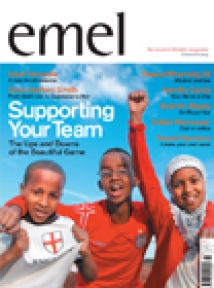
Dilwar Hussain - The Normalisation of Islam
Issue 6 Jun / Jul 2004
First Published on July/August 2004
To access the issue page, click here
It may be that the process of distinguishing between Islam per se, and Muslim cultural accretions, is a healthy exercise, for it may allow a whole generation of Muslims in the West to see Islam for its principles and values rather than its historical application with all the aberrations thismay have created.
Its ‘open season’, and there seems to bea long list of people willing to have a jab at Muslims. Can Muslims ever really be British or European? How did we get to this position of such severe tension? The historical encounter between Muslims and European society, despite many positive achievements, has largely resulted in a mutual stereotyping of each other. In the post-World War II world the arrival of large number of Muslims presented a set of serious predicaments. The challenge posed to European Muslims is normalisation – to be seen not as a problem, a threat or a strange entity, but as an indigenous and genuine European phenomenon.The challenge that Muslims pose is two-fold: (i)They threaten the accepted notions of citizenship –can plurality exist within the modern nation state?(ii) They challenge the perceived sense of secularism– can religious or transcendental values havea role in the public domain? This may have comeout of the 20th century encounter, but Islam is notnew to Europe, in fact it has been in Europe since almost its inception. Tariq bin Ziyad entered Spain in 711CE, and while the Muslims of Spain and Southern Europe were being expelled in the 15thand 16th century, others were arriving into Eastern Europe. Muslims ruled Spain for nearly 800 years and Sicily for about 200 years.
Sadly, the result is a historical legacy that is characterised by suspicion, misinformation and enmity. Some of the images of the Muslim ‘Other’ could be typified by the following examples:
■ Peter the Venerable (1094 - 1156) described the Prophet as a disciple of Satan. (Peter the Venerable charged Robert of Ketton with translating the Qur’an. The translation contained nine extra chapters!)
■ Dante Alighieri (1265 - 1321) in his Divine Comedy describes Muhammad and Ali (the cousin of Muhammad) being punished in Hell. The Prophet is in one of the most central circles, close to the devil.
■ Constantine de Volney (1757 - 1820) in his Travels in Egypt and Syria wrote about the Qur’an “…of all the absurd creations of the human mind none is more wretched than this book.” Apart from this, a whole host of scholarly and popular writings, oral narration, plays etc. helped to create a fixation with the Muslim Orient. The images created by this legacy continue to linger, and are often conveniently borrowed in the modern era.
(This is not to even mention the stereotypes of the West held by the Muslim world, which would call for a whole article in itself.)
Christianity and Judaism (perhaps to a lesser degree) are now accepted components of Europe. One can hear talk of the ‘Judeo-Christian heritage of Europe’ or of ‘Judeo-Christian values’. Few would think of Christians and Jews as foreigners to Europe – they have been normalised. Yet Islam remains the Other, even though its contribution to European ideas and values are significant and justas great, some would say greater; even though all three Abrahamic faiths have Middle Eastern origins, share very similar ethical and moral outlooks and have essentially similar world views.
In an attempt to make Islam more relevant to modern Europe, Murad Hofmann, asks Muslims to think of:
“…separating religion and civilization. Only if we can peel away the many layers of civilizationary, local lacquer can Islam…become universally relevant…”
But given the reality of globalization, is such a detachment from history and cultural tradition an ideal way to deal with the contemporary? And is it possible that a sudden stripping of imported culture would leave a vacuum that would create or exacerbate an identity ‘crisis’ rather than address one? Perhaps Muslims can in some ways also enrich Western culture with some of their ‘cultural baggage’? Food is a prime example of this. In any case, it may be that the process of distinguishing between Islam per se, and Muslim cultural accretions,is a healthy exercise, for it may allow a whole generation of Muslims in the West to see Islam for its principles and values rather than its historical application with all the aberrations this may have created. This can indeed be a revitalizing opportunity and one of the challenges for Muslims living in Britain and the West. Integral to this process is the search for new solutions to the fiqhi (jurisprudential) challenges that face Muslims living in Europe. We can already see that there has been a re-evaluation of important issues such as the participation of women in society, the attitude towards people ofother faiths, political participation and engagement in civil society. It would not be an exaggeration to say that by looking through the window of Western liberalism and feminism, Muslims have begun to
challenge the traditional practices of many of the Eastern countries. And I do not think the narrative of change is yet complete on these issues.
Some genuine questions continue to perplex Muslims who are living through the process of maturation of their shifting identities. For example, how do Muslims come to terms with loyalty to their identities as British or French
citizens and the wider Muslim world (ummah)? What is to be done when elements of European society do not want Islam to be part of Europe? How can Muslims open up the debate on plurality and diversity and express citizenship in ways that are more meaningful to their existence and akin to
their faith than merely as individual consumers? Is a community existence possible? And what should Muslims do with their citizenship? Can they bring something of unique and added value to European society?
At a time when intense scrutiny faces Muslims, Islam has become fetishised, an oddity, the archetypal ‘Other’. This must stop, if Islam is to become a ‘normal’ entity. Of course, many external conditions need to be suitable, but the internal issues are what concern me here. Faith requires something far more profound than mere activism, we cannot only be a movement of protest; faith requires that Muslims live in British society and involve themselves in it fully, that they become of it and own it, that they are seen as of it and belonging to it – that they simply live Islam rather than preach Islam. Prophet Muhammad was known as ‘the trustworthy’, ‘the truthful’. How many Muslims in Britain have the same reputation? They seem to be too obsessed with international events to pay much attention to anything else. How can they play a profoundly spiritual melody so that it can rise above the din of the political injustices they also face?
Perhaps our time is what the Prophet described when he said “Islam began as a stranger and will return as a stranger”. I do not think the purpose was to eternalise the strangeness of the stranger – but to “give glad tidings to the stranger,” ie. give us hope and confidence. And with that hope and confidence we must proceed.
Hope and confidence allow us to talk to the other and appreciate the other, and it is by talking and appreciating that we may realise that the other is normal. But there is a deeper issue here. How does the Muslim world discuss with a civilisation that has taken some of the best features of the Islamic ideals and achieved high standards in them? Think of free societies, accountable governance, rule of law, prosperity, education, charity, protection of minorities and individual rights, etc. Then think of the objectives of the Shariah: the protection of life, intellect, faith, progeny and property (to which some scholars such as Hashim Kamali have now added freedom and economic development), with the overarching aim of justice and the common interest / benefit (maslaha). Think of where these values are actualised better?
Having embraced Muslim philosophy, science, mathematics and developed them to new levels, the West has left the Muslim world with only a heritage to be proud of, a mere tradition, while the West is here and now. To add to this, many Muslims are also now part of that West so the discussion is not really between ‘them’ and ‘us’ but between ‘us’ and ‘us’, amongst ourselves, with our common humanity. Talk of ‘clash of civilisations’ in this context is not only dangerous and irresponsible (for the false fault-lines it perpetuates), it is also foolish. To pit the West and Islam against each other in a clash necessitates, firstly, two distinct entities which I would argue do not really exist, and secondly, the essentialisation of both into simple binary opposites. This denies the complexity of views, values and ideals that exist among all people. Muslims living in the West may not agree with certain material motivations in the West or the way the family is being neglected, and on these issues they may stand together with many of their fellow citizens of Christian and other faith and non-faith backgrounds. Muslims living in the West may take issue with the current state of social and international justice, and they would, again, stand with a majority of their fellow citizens. On concern about the environment, again Muslims would stand firmly with the people. It may be
possible that in each of these cases ‘the people’ would be different groups, hence such alliances are constantly shifting and reforming, as you would expect, depending on people’s values, the context and the issue.
If the above is true, then Europe is not based on a fundamentally different ethos to Islam. Christianity, Judaism and Islam, which essentially embody the same world views, have played a significant enough role in the development of Europe to leave a permanent imprint on it. However, it is not just Europe’s religious heritage that is akin to Islam; one of the great strengths of this faith is that it can uniquely appreciate the transcendental and temporal like no other religion.
Of the more temporal values of the scientific revolution and renaissance humanism, there are again some areas of common ground with the Islamic ethos; in fact some of European enlightenment was directly inspired by Islam. Europe and Islam have far more in common than we think. The debate is hence not a civilisational one but is a debate between values. That’s normal enough…
Bookmark this |
|
Add to DIGG |
|
Add to del.icio.us |
|
Stumble this |
|
Share on Facebook |
|
Share this |
|
Send to a Friend |
|
Link to this |
|
Printer Friendly |
|
Print in plain text |
|


Comments
0 Comments